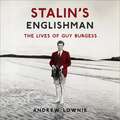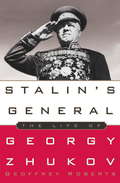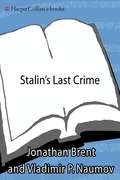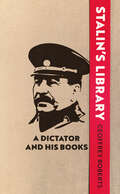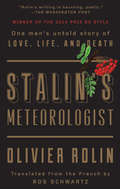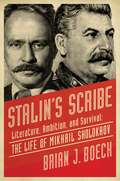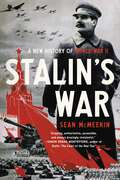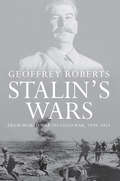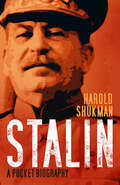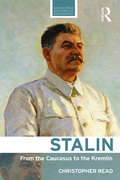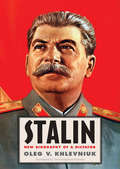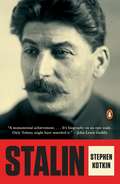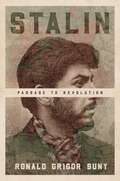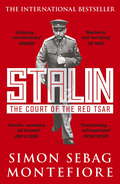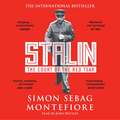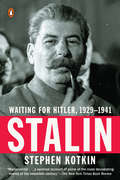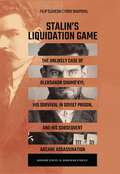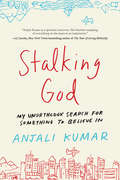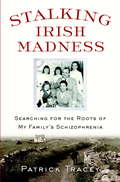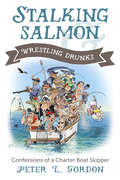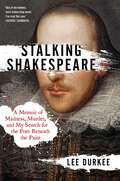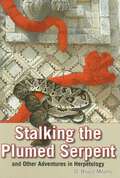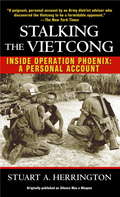- Table View
- List View
Stalin's Englishman: The Lives of Guy Burgess
by Andrew LownieGuy Burgess was the most important, complex and fascinating of 'The Cambridge Spies' - Maclean, Philby, Blunt - all brilliant young men recruited in the 1930s to betray their country to the Soviet Union. An engaging and charming companion to many, an unappealing, utterly ruthless manipulator to others, Burgess rose through academia, the BBC, the Foreign Office, MI5 and MI6, gaining access to thousands of highly sensitive secret documents which he passed to his Russian handlers.In this first full biography, Andrew Lownie shows us how even Burgess's chaotic personal life of drunken philandering did nothing to stop his penetration and betrayal of the British Intelligence Service. Even when he was under suspicion, the fabled charm which had enabled many close personal relationships with influential Establishment figures (including Winston Churchill) prevented his exposure as a spy for many years.Through interviews with more than a hundred people who knew Burgess personally, many of whom have never spoken about him before, and the discovery of hitherto secret files, Stalin's Englishman brilliantly unravels the many lives of Guy Burgess in all their intriguing, chilling, colourful, tragi-comic wonder.(P)2015 Hodder & Stoughton
Stalin's General: The Life of Georgy Zhukov
by Geoffrey RobertsWidely regarded as the most accomplished general of World War II, the Soviet military legend Marshal Georgy Zhukov at last gets the full-scale biographical treatment he has long deserved. A man of indomitable will and fierce determination, Georgy Zhukov was the Soviet Union's indispensable commander through every one of the critical turning points of World War II. It was Zhukov who saved Leningrad from capture by the Wehrmacht in September 1941, Zhukov who led the defense of Moscow in October 1941, Zhukov who spearheaded the Red Army's march on Berlin and formally accepted Germany's unconditional surrender in the spring of 1945. Drawing on the latest research from recently opened Soviet archives, including the uncensored versions of Zhukov's own memoirs, Roberts offers a vivid portrait of a man whose tactical brilliance was matched only by the cold-blooded ruthlessness with which he pursued his battlefield objectives. After the war, Zhukov was a key player on the geopolitical scene. As Khrushchev's defense minister, he was one of the architects of Soviet military strategy during the Cold War. While lauded in the West as a folk hero--he was the only Soviet general ever to appear on the cover of Time magazine--Zhukov repeatedly ran afoul of the Communist political authorities. Wrongfully accused of disloyalty, he was twice banished and erased from his country's official history--left out of books and paintings depicting Soviet World War II victories. Piercing the hyperbole of the Zhukov personality cult, Roberts debunks many of the myths that have sprung up around Zhukov's life and career to deliver fresh insights into the marshal's relationships with Stalin, Khrushchev, and Eisenhower. A remarkably intimate portrait of a man whose life was lived behind an Iron Curtain of official secrecy, Stalin's General is an authoritative biography that restores Zhukov to his rightful place in the twentieth-century military pantheon.From the Hardcover edition.e was lived behind an Iron Curtain of official secrecy, Stalin's General is a full, fair, and authoritative biography that restores Zhukov to his rightful place in the twentieth-century military pantheon.From the Hardcover edition.
Stalin's Last Crime
by Vladimir Naumov Jonathan BrentA new investigation, based on previously unseen KGB documents, reveals the startling truth behind Stalin's last great conspiracy. On January 13, 1953, a stunned world learned that a vast conspiracy had been unmasked among Jewish doctors in the USSR to murder Kremlin leaders. Mass arrests quickly followed. The Doctors' Plot, as this alleged scheme came to be called, was Stalin's last crime. In the fifty years since Stalin's death many myths have grown up about the Doctors' Plot. Did Stalin himself invent the conspiracy against the Jewish doctors or was it engineered by subordinates who wished to eliminate Kremlin rivals? Did Stalin intend a purge of all Jews from Moscow, Leningrad, and other major cities, which might lead to a Soviet Holocaust? How was this plot related to the cold war then dividing Europe, and the hot war in Korea? Finally, was the Doctors' Plot connected with Stalin's fortuitous death? Brent and Naumov have explored an astounding arra of previously unknown, top-secret documents from the KGB, the presidential archives, and other state and party archives in order to probe the mechanism of on of Stalin's greatest intrigues -- and to tell for the first time the incredible full story of the Doctors' Plot.
Stalin's Library: A Dictator and his Books
by Geoffrey RobertsA compelling intellectual biography of Stalin told through his personal library &“[A] fascinating new study.&”—Michael O&’Donnell, Wall Street Journal In this engaging life of the twentieth century&’s most self-consciously learned dictator, Geoffrey Roberts explores the books Stalin read, how he read them, and what they taught him. Stalin firmly believed in the transformative potential of words and his voracious appetite for reading guided him throughout his years. A biography as well as an intellectual portrait, this book explores all aspects of Stalin&’s tumultuous life and politics. Stalin, an avid reader from an early age, amassed a surprisingly diverse personal collection of thousands of books, many of which he marked and annotated revealing his intimate thoughts, feelings, and beliefs. Based on his wide-ranging research in Russian archives, Roberts tells the story of the creation, fragmentation, and resurrection of Stalin&’s personal library. As a true believer in communist ideology, Stalin was a fanatical idealist who hated his enemies—the bourgeoisie, kulaks, capitalists, imperialists, reactionaries, counter-revolutionaries, traitors—but detested their ideas even more.
Stalin's Meteorologist: One Man's Untold Story of Love, Life, and Death
by Olivier RolinWinner of the 2014 Prix du Style "Masterful . . . An eloquent addition to a violent episode in the history of science in the twentieth century." —Nature In 1934, the highly respected head of the Soviet Union’s meteorology department, Alexei Feodosievich Wangenheim, was suddenly arrested without cause and sentenced to a gulag. Less than a year after being hailed by Stalin as a national hero, he ended up with thousands of other "political prisoners" in a camp on Solovetsky Island, under vast northern skies and surrounded by water that was, for more than six months of the year, a sheet of motionless ice. He was violently executed in 1937—a fact kept from his family for nearly twenty years. Olivier Rolin masterfully weaves together Alexei's story and his eventual fate, drawing on an archive of letters and delicate drawings of the natural world that Wangenheim sent to his family from prison. Tragically, Wangenheim never stopped believing in the Revolution, maintaining that he'd been incarcerated by accident, that any day Stalin would find out and free him. His stubbornness suffuses the narrative with tension, and offers insight as to how he survived an impossible situation for so long. Stalin’s Meteorologist is a fascinating work that casts light on the devastating consequences of politically inspired paranoia and the mindlessness and trauma of totalitarianism—relevant revelations for our time.
Stalin's Nose: Across the Face of Europe
by Rory MacleanThis surreal and darkly comic tale is based on the author's journey from Berlin to Moscow, through Czechoslovakia, Hungary, Poland and Romania, only weeks after the fall of the Berlin Wall.
Stalin's Scribe: Literature, Ambition, And Survival: The Life Of Mikhail Sholokhov
by Brian BoeckA masterful and definitive biography of one of the most misunderstood and controversial writers in Russian literature. Mikhail Sholokhov is arguable one of the most contentious recipients of the Nobel Prize in Literature. As a young man, Sholokhov’s epic novel, Quiet Don, became an unprecedented overnight success. Stalin’s Scribe is the first biography of a man who was once one of the Soviet Union’s most prominent political figures. Thanks to the opening of Russia’s archives, Brian Boeck discovers that Sholokhov’s official Soviet biography is actually a tangled web of legends, half-truths, and contradictions. Boeck examines the complex connection between an author and a dictator, revealing how a Stalinist courtier became an ideological acrobat and consummate politician in order to stay in favor and remain relevant after the dictator’s death. Stalin's Scribe is remarkable biography that both reinforces and clashes with our understanding of the Soviet system. It reveals a Sholokhov who is bold, uncompromising, and sympathetic—and reconciles him with the vindictive and mean-spirited man described in so many accounts of late Soviet history. Shockingly, at the height of the terror, which claimed over a million lives, Sholokhov became a member of the most minuscule subset of the Soviet Union’s population—the handful of individuals whom Stalin personally intervened to save.
Stalin's War: A New History of World War II
by Sean McMeekinA prize-winning historian reveals how Stalin—not Hitler—was the animating force of World War II in this major new history.We remember World War II as a struggle between good and evil, with Hitler propelling events and the Allied powers saving the day. But Hitler's armies did not fight in multiple theaters, his empire did not span the Eurasian continent, and he did not inherit the spoils of war. That role belonged to Joseph Stalin. Hitler's genocidal ambition may have unleashed Armageddon, but as celebrated historian Sean McMeekin shows, the conflicts that emerged were the result of Stalin's maneuverings, orchestrated to unleash a war between capitalist powers in Europe and between Japan and the Anglo-American forces in the Pacific. Meanwhile, the United States and Britain's self-defeating strategy of supporting Stalin and his armies at all costs allowed the Soviets to conquer most of Eurasia, from Berlin to Beijing, for Communism.A groundbreaking reassessment, Stalin's War is essential reading for anyone looking to understand the roots of the current world order.
Stalin's Wars: From World War to Cold War, 1939-1953
by Geoffrey RobertsThis breakthrough book provides a detailed reconstruction of Stalin's leadership from the outbreak of the Second World War in 1939 to his death in 1953. Making use of a wealth of new material from Russian archives, Geoffrey Roberts challenges a long list of standard perceptions of Stalin: his qualities as a leader; his relationships with his own generals and with other great world leaders; his foreign policy; and his role in instigating the Cold War. While frankly exploring the full extent of Stalin's brutalities and their impact on the Soviet people, Roberts also uncovers evidence leading to the stunning conclusion that Stalin was both the greatest military leader of the twentieth century and a remarkable politician who sought to avoid the Cold War and establish a long-term detente with the capitalist world. By means of an integrated military, political, and diplomatic narrative, the author draws a sustained and compelling personal portrait of the Soviet leader. The resulting picture is fascinating and contradictory, and it will inevitably change the way we understand Stalin and his place in history. Roberts depicts a despot who helped save the world for democracy, a personal charmer who disciplined mercilessly, a utopian ideologue who could be a practical realist, and a warlord who undertook the role of architect of post-war peace.
Stalin: A Pocket Biography
by Harold ShukmanJoseph Stalin was one of the most ruthless and authoritarian dictators in world history, who plunged Russia into a barbarous nightmare, leaving behind a damaged nation and a legacy of grief.This concise biography presents Lenin’s heir from his humble and troubled beginnings to the highest rank of all: General Secretary of the Communist Party. Stalin: A Pocket Biography is an accessible account of a complex tyrant, perfect for students or anyone taking a first look into modern Russian history.
Stalin: From the Caucasus to the Kremlin (Routledge Historical Biographies)
by Christopher ReadThis new biography of Stalin offers an accessible and up-to-date representation of one of the twentieth-century’s defining figures, as well as new insights, analysis and illumination to deepen our understanding of his actions, intentions and the nature of the power that he wielded. Christopher Read examines Stalin’s contribution to and impact on Russian and world events in the first half of the twentieth century. The biography brings together the avalanche of sources and scholarship which followed the collapse of the system Stalin constructed, including the often neglected writings and speeches of Stalin himself. In addition to a detailed narrative and analysis of Stalin’s rule, chapters also cover his early years and humble beginnings in a small town at a remote outpost of the Russian Empire, his role in the revolution, his relationships with Lenin, Trotsky and others in the 1920s, and his rise to become one of the most powerful figures in human history. The book closes with an account of Stalin’s afterlife and legacy, both in the immediate aftermath of his death and in the decades since. This concise account of Stalin’s life is the perfect introduction for students of modern Russian history.
Stalin: New Biography of a Dictator (The\yale-hoover Series On Authoritarian Regimes Ser.)
by Oleg V. KhlevniukAn engrossing biography of the notorious Russian dictator by an author whose knowledge of Soviet-era archives far surpasses all others.Josef Stalin exercised supreme power in the Soviet Union from 1929 until his death in 1953. During that quarter-century, by Oleg Khlevniuk&’s estimate, he caused the imprisonment and execution of no fewer than a million Soviet citizens per year. Millions more were victims of famine directly resulting from Stalin&’s policies. What drove him toward such ruthlessness? This essential biography offers an unprecedented, fine-grained portrait of Stalin the man and dictator. Without mythologizing Stalin as either benevolent or an evil genius, Khlevniuk resolves numerous controversies about specific events in the dictator&’s life while assembling many hundreds of previously unknown letters, memos, reports, and diaries into a comprehensive, compelling narrative of a life that altered the course of world history. In brief, revealing prologues to each chapter, Khlevniuk takes his reader into Stalin&’s favorite dacha, where the innermost circle of Soviet leadership gathered as their vozhd lay dying. Chronological chapters then illuminate major themes: Stalin&’s childhood, his involvement in the Revolution and the early Bolshevik government under Lenin, his assumption of undivided power and mandate for industrialization and collectivization, the Terror, World War II, and the postwar period. At the book&’s conclusion, the author presents a cogent warning against nostalgia for the Stalinist era. &“This brilliant, authoritative, opinionated biography ranks as the best on Stalin in any language.&”—Martin McCauley East-West Review&“A historiographical and literary masterpiece.&”—Mark Edele, Australian Book Review&“A very digestible biography, yet one packed with revelations.&”—Paul E. Richardson, Russian Life Magazine
Stalin: Paradoxes of Power, 1878-1928
by Stephen KotkinA magnificent new biography that revolutionizes our understanding of Stalin and his worldIt has the quality of myth: a poor cobbler&’s son, a seminarian from an oppressed outer province of the Russian empire, reinvents himself as a top leader in a band of revolutionary zealots. When the band seizes control of the country in the aftermath of total world war, the former seminarian ruthlessly dominates the new regime until he stands as absolute ruler of a vast and terrible state apparatus, with dominion over Eurasia. While still building his power base within the Bolshevik dictatorship, he embarks upon the greatest gamble of his political life and the largest program of social reengineering ever attempted: the collectivization of all agriculture and industry across one sixth of the earth. Millions will die, and many more millions will suffer, but the man will push through to the end against all resistance and doubts.Where did such power come from? In Stalin, Stephen Kotkin offers a biography that, at long last, is equal to this shrewd, sociopathic, charismatic dictator in all his dimensions. The character of Stalin emerges as both astute and blinkered, cynical and true believing, people oriented and vicious, canny enough to see through people but prone to nonsensical beliefs. We see a man inclined to despotism who could be utterly charming, a pragmatic ideologue, a leader who obsessed over slights yet was a precocious geostrategic thinker—unique among Bolsheviks—and yet who made egregious strategic blunders. Through it all, we see Stalin&’s unflinching persistence, his sheer force of will—perhaps the ultimate key to understanding his indelible mark on history.Stalin gives an intimate view of the Bolshevik regime&’s inner geography of power, bringing to the fore fresh materials from Soviet military intelligence and the secret police. Kotkin rejects the inherited wisdom about Stalin&’s psychological makeup, showing us instead how Stalin&’s near paranoia was fundamentally political, and closely tracks the Bolshevik revolution&’s structural paranoia, the predicament of a Communist regime in an overwhelmingly capitalist world, surrounded and penetrated by enemies. At the same time, Kotkin demonstrates the impossibility of understanding Stalin&’s momentous decisions outside of the context of the tragic history of imperial Russia.The product of a decade of intrepid research, Stalin is a landmark achievement, a work that recasts the way we think about the Soviet Union, revolution, dictatorship, the twentieth century, and indeed the art of history itself.Stalin: Waiting for Hitler, 1929-1941 will be published by Penguin Press in October 2017
Stalin: Passage to Revolution
by Ronald Grigor SunyA spellbinding new biography of Stalin in his formative yearsThis is the definitive biography of Joseph Stalin from his birth to the October Revolution of 1917, a panoramic and often chilling account of how an impoverished, idealistic youth from the provinces of tsarist Russia was transformed into a cunning and fearsome outlaw who would one day become one of the twentieth century's most ruthless dictators.In this monumental book, Ronald Grigor Suny sheds light on the least understood years of Stalin's career, bringing to life the turbulent world in which he lived and the extraordinary historical events that shaped him. Suny draws on a wealth of new archival evidence from Stalin's early years in the Caucasus to chart the psychological metamorphosis of the young Stalin, taking readers from his boyhood as a Georgian nationalist and romantic poet, through his harsh years of schooling, to his commitment to violent engagement in the underground movement to topple the tsarist autocracy. Stalin emerges as an ambitious climber within the Bolshevik ranks, a resourceful leader of a small terrorist band, and a writer and thinker who was deeply engaged with some of the most incendiary debates of his time.A landmark achievement, Stalin paints an unforgettable portrait of a driven young man who abandoned his religious faith to become a skilled political operative and a single-minded and ruthless rebel.
Stalin: The Court of the Red Tsar
by Simon Sebag MontefioreWinner of the British Book Awards History Book of the YearLonglisted for the Samuel Johnson PrizeThis thrilling biography of Stalin and his entourage during the terrifying decades of his supreme power transforms our understanding of Stalin as Soviet dictator, Marxist leader and Russian tsar. Based on groundbreaking research, Simon Sebag Montefiore reveals in captivating detail the fear and betrayal, privilege and debauchery, family life and murderous cruelty of this secret world. Written with extraordinary narrative verve, this magnificent feat of scholarly research has become a classic of modern history writing. Showing how Stalin's triumphs and crimes were the product of his fanatical Marxism and his gifted but flawed character, this is an intimate portrait of a man as complicated and human as he was brutal and chilling.
Stalin: The Court of the Red Tsar
by Simon Sebag MontefioreWinner of the British Book Awards History Book of the YearLonglisted for the Samuel Johnson PrizeThis thrilling biography of Stalin and his entourage during the terrifying decades of his supreme power transforms our understanding of Stalin as Soviet dictator, Marxist leader and Russian tsar. Based on groundbreaking research, Simon Sebag Montefiore reveals in captivating detail the fear and betrayal, privilege and debauchery, family life and murderous cruelty of this secret world. Written with extraordinary narrative verve, this magnificent feat of scholarly research has become a classic of modern history writing. Showing how Stalin's triumphs and crimes were the product of his fanatical Marxism and his gifted but flawed character, this is an intimate portrait of a man as complicated and human as he was brutal and chilling.Read by John Nettles(p) 2004 Orion Publishing Group
Stalin: The Court of the Red Tsar (Orion 20th Anniversary Editions Ser.)
by Simon Sebag MontefioreThis widely acclaimed biography provides a vivid and riveting account of Stalin and his courtiers--killers, fanatics, women, and children--during the terrifying decades of his supreme power. In a seamless meshing of exhaustive research and narrative ?lan, Simon Sebag Montefiore gives us the everyday details of a monstrous life.We see Stalin playing his deadly game of power and paranoia at debauched dinners at Black Sea villas and in the apartments of the Kremlin. We witness first-hand how the dictator and his magnates carried out the Great Terror and the war against the Nazis, and how their families lived in this secret world of fear, betrayal, murder, and sexual degeneracy. Montefiore gives an unprecedented understanding of Stalin's dictatorship, and a Stalin as human and complicated as he is brutal.From the Trade Paperback edition.otov, Beria and Yezhov among them-the author sheds new light on the oligarchy that attempted to create a new world by exterminating the old. He gives us the details of their quotidian and monstrous lives: Stalin's favorites in music, movies, literature (Hemmingway, The Forsyte Saga and The Last of the Mohicans were at the top of his list), food and history (he took Ivan the Terrible as his role model and swore by Lenin's dictum, "A revolution without firing squads is meaningless"). We see him among his courtiers, his informal but deadly game of power played out at dinners and parties at Black Sea villas and in the apartments of the Kremlin. We see the debauchery, paranoia and cravenness that ruled the lives of Stalin's inner court, and we see how the dictator played them one against the other in order to hone the awful efficiency of his killing machine.With stunning attention to detail, Montefiore documents the crimes, small and large, of all the members of Stalin's court. And he traces the intricate and shifting web of their relationships as the relative warmth of Stalin's rule in the early 1930s gives way to the Great Terror of the late 1930s, the upheaval of World War II (there has never been as acute an account of Stalin's meeting at Yalta with Churchill and Roosevelt) and the horrific postwar years when he terrorized his closest associates as unrelentingly as he did the rest of his country.Stalin: The Court of the Red Tsar gives an unprecedented understanding of Stalin's dictatorship, and, as well, a Stalin as human and complicated as he is brutal. It is a galvanizing portrait: razor-sharp, sensitive and unforgiving.From the Hardcover edition.
Stalin: Waiting for Hitler, 1929-1941
by Stephen Kotkin&“Monumental.&” —The New York Times Book ReviewPulitzer Prize-finalist Stephen Kotkin has written the definitive biography of Joseph Stalin, from collectivization and the Great Terror to the conflict with Hitler's Germany that is the signal event of modern world history In 1929, Joseph Stalin, having already achieved dictatorial power over the vast Soviet Empire, formally ordered the systematic conversion of the world&’s largest peasant economy into &“socialist modernity,&” otherwise known as collectivization, regardless of the cost. What it cost, and what Stalin ruthlessly enacted, transformed the country and its ruler in profound and enduring ways. Building and running a dictatorship, with life and death power over hundreds of millions, made Stalin into the uncanny figure he became. Stephen Kotkin&’s Stalin: Waiting for Hitler, 1929–1941 is the story of how a political system forged an unparalleled personality and vice versa. The wholesale collectivization of some 120 million peasants necessitated levels of coercion that were extreme even for Russia, and the resulting mass starvation elicited criticism inside the party even from those Communists committed to the eradication of capitalism. But Stalin did not flinch. By 1934, when the Soviet Union had stabilized and socialism had been implanted in the countryside, praise for his stunning anti-capitalist success came from all quarters. Stalin, however, never forgave and never forgot, with shocking consequences as he strove to consolidate the state with a brand new elite of young strivers like himself. Stalin&’s obsessions drove him to execute nearly a million people, including the military leadership, diplomatic and intelligence officials, and innumerable leading lights in culture. While Stalin revived a great power, building a formidable industrialized military, the Soviet Union was effectively alone and surrounded by perceived enemies. The quest for security would bring Soviet Communism to a shocking and improbable pact with Nazi Germany. But that bargain would not unfold as envisioned. The lives of Stalin and Hitler, and the fates of their respective dictatorships, drew ever closer to collision, as the world hung in the balance. Stalin: Waiting for Hitler, 1929–1941 is a history of the world during the build-up to its most fateful hour, from the vantage point of Stalin&’s seat of power. It is a landmark achievement in the annals of historical scholarship, and in the art of biography.
Stalin’s Liquidation Game: The Unlikely Case of Oleksandr Shums'kyi, His Survival in Soviet Prison, and His Subsequent Arcane Assassination (Harvard Series in Ukrainian Studies #86)
by Filip Slaveski Yuri ShapovalMillions of innocent people were arrested in Stalin’s Soviet Union during the 1930s in different waves of mass repression. Under violent interrogation, many were forced to confess to crimes they did not commit. Rather than save their lives, as the interrogators had promised, confession was usually the last step to their execution. Very few of those arrested eventually refused to confess.Oleksandr Shums’kyi, the Ukrainian Marxist revolutionary, was one of the most important but least known of them. He not only refused to confess but sustained for over a decade a massive protest against his repression and the Stalinist attack on his country, Ukraine. Stalin punished him mercilessly in response, paralyzing him in jail and murdering his wife, but refrained from assassinating him for more than ten years.This book unravels the Shums’kyi riddle to explain why. In doing so, it opens a new window into understanding the history of Soviet repression and the Russian pathologies toward Ukrainian independence, which help us understand Russia’s current war against Ukraine.
Stalking God: My Unorthodox Search for Something to Believe In
by Anjali KumarAnjali Kumar, a pragmatic lawyer for Google, was part of a rapidly growing population in America: highly spiritual but religiously uncommitted. But when her daughter was born, she became compelled to find God--or at least some kind of enlightenment.Convinced that traditional religions were not a fit for her, and knowing that she couldn't simply Google an answer to "What is the meaning of life?", Kumar set out on a spiritual pilgrimage, looking for answers--and nothing was off limits or too unorthodox. She headed to the mountains of Peru to learn from the shamans, attended the techie haunt of Burning Man, practiced transcendental meditation, convened with angels, and visited saints, goddesses, witches, and faith healers. She even hired a medium to convene with the dead. Kumar's lighthearted story offers a revealing look at the timeless and vexing issue of spirituality in an era when more and more people are walking away from formal religions. Narrated from the open-minded perspective of a spiritual seeker rather than a religious scholar, Kumar offers an honest account of some of the less than mainstream spiritual practices that are followed by millions of people in the world today as she searches for the answers to life's most universal questions: Why are we here? What happens when we die? Is there a God?
Stalking Irish Madness: Searching for the Roots of My Family's Schizophrenia
by Patrick TraceyIn this powerful, sometimes harrowing, deeply felt story, Patrick Tracey journeys to Ireland to track the origin and solve the mystery of his Irish-American family's multigenerational struggle with schizophrenia. For most Irish Americans, a trip to Ireland is often an occasion to revisit their family's roots. But for Patrick Tracey, the lure of his ancestral home is a much more powerful need: part pilgrimage, part investigation to confront the genealogical mystery of schizophrenia-a disease that had claimed a great-great-great-grandmother, a grandmother, an uncle, and, most recently, two sisters. As long as Tracey could remember, schizophrenia ran on his mother's side, seldom spoken of outright but impossible to ignore. Devastated by the emotional toll the disease had already taken on his family, terrified of passing it on to any children he might have, and inspired by the recent discovery of the first genetic link to schizophrenia, Tracey followed his genealogical trail from Boston to Ireland's county Roscommon, home of his oldest-known schizophrenic ancestor. In a renovated camper, Tracey crossed the Emerald Isle to investigate the country that, until the 1960s, had the world's highest rate of institutionalization for mental illness, following clues and separating fact from fiction in the legendary relationship the Irish have had with madness. Tracey's path leads from fairy mounds and ancient caverns still shrouded in superstition to old pubs whose colorful inhabitants are a treasure trove of local lore. He visits the massive and grim asylum where his famine starved ancestors may have lived. And he interviews the Irish research team that first cracked the schizophrenic code to learn how much-and how little-we know about this often misunderstood disease. Filled with history, science, and lore,Stalking Irish Madnessis an unforgettable chronicle of one man's attempt to make sense of his family's past and to find hope for the future of schizophrenic patients. From the Hardcover edition.
Stalking Salmon and Wrestling Drunks: Confessions of a Charter Boat Skipper
by Peter L. GordonEach fisherman steps onto the docks, sees Peter Gordon's boat the MV Kalua, glances at the other members of the charter and feels a rush of anticipation. The challenge is on to see who will catch the biggest fish.Told with a skipper's authority, Stalking Salmon and Wrestling Drunks recounts the highs and lows of fishing with tourists, including dealing with rowdy guests, bad weather, near death experiences, lost fish, tangled lines, and sometimes even tragedy. Gordon's humour and tenacity shines through each tale to create an energetic memoir that will appeal to fishing enthusiasts, observers of human behaviour, travellers and anyone interested in recreational fishing.Stalking Salmon and Wrestling Drunks exemplifies the quintessential BC West Coast experience; however, the stories are much more than great fishing trips. As the skipper, each charter brought Gordon the challenge of "bringing together the most unlikely people, people who would never choose to spend four or five hours together." It might be as simple as children or jobs, but Gordon thrived on deeper, more powerful connections like re-introducing two men who had been in the same concentration camp together during World War II and hadn't seen each other since.For Gordon, each charter was not only about a skipper and his crew, but was an opportunity to encourage each person to have an exceptional experience. Stalking Salmon and Wrestling Drunks tells each story with precision, an eye for detail and the good-natured humour that carried the author through each day on the rough seas. This collection is a delightful balance between the adventure of open-water fishing, helping people cross the last item off their bucket list and making life-long friends in the process.
Stalking Shakespeare: A Memoir of Madness, Murder, and My Search for the Poet Beneath the Paint
by Lee DurkeeA darkly humorous and spellbinding detective story that chronicles one Mississippi man&’s relentless search for an authentic portrait of William Shakespeare.Following his divorce, down-and-out writer and Mississippi exile Lee Durkee holed himself up in a Vermont fishing shack and fell prey to a decades-long obsession with Shakespearian portraiture. It began with a simple premise: despite the prevalence of popular portraits, no one really knows what Shakespeare looked like. That the Bard of Avon has gotten progressively handsomer in modern depictions seems only to reinforce this point. Stalking Shakespeare is Durkee&’s fascinating memoir about a hobby gone awry, the 400-year-old myriad portraits attached to the famous playwright, and Durkee&’s own unrelenting search for a lost picture of the Bard painted from real life. As Durkee becomes better at beguiling curators into testing their paintings with X-ray and infrared technologies, we get a front-row seat to the captivating mysteries—and unsolved murders—surrounding the various portraits rumored to depict Shakespeare. Whisking us backward in time through layers of paint and into the pages of obscure books on the Elizabethans, Durkee travels from Vermont to Tokyo to Mississippi to DC and ultimately to London to confront the stuffy curators forever protecting the Bard&’s image. For his part, Durkee is the adversary they didn&’t know they had—a self-described dilettante with nothing to lose, the &“Dan Brown of English portraiture.&” A lively, bizarre, and surprisingly moving blend of biography, art history, and madness, Stalking Shakespeare is as entertaining as it is rigorous and will forever change the way you look at one of history&’s greatest cultural and literary icons.
Stalking the Plumed Serpent and Other Adventures in Herpetology
by D. Bruce MeansBased on his more than 40 years of field research, Means, an expert on the eastern diamondback rattlesnake, reveals the biological complexity and beauty of the animals he has studied. In Australia, Means searches for the fiercey, reputed to be the worlds deadliest terrestrial snake. In Mexico, he stalks the rattlesnake that might have served as the model for the mythical plumed serpent of Mayan art. In Florida, he is chased by cottonmouth moccasins. Through his experiences, Means hopes that readers will gain a new appreciation for animals called herps, or creepy-crawly things.
Stalking the Vietcong
by Stuart HerringtonIn a gripping memoir that reads like a spy novel, one man recounts his personal experience with Operation Phoenix, the program created to destroy the Vietcong's shadow government, which thrived in the rural communities of South Vietnam.Stuart A. Herrington was an American intelligence advisor assigned to root out the enemy in the Hau Nghia province. His two-year mission to capture or kill Communist agents operating there was made all the more difficult by local officials who were reluctant to cooperate, villagers who were too scared to talk, and VC who would not go down without a fight. Herrington developed an unexpected but intense identification with the villagers in his jurisdiction-and learned the hard way that experiencing war was profoundly different from philosophizing about it in a seminar room.
